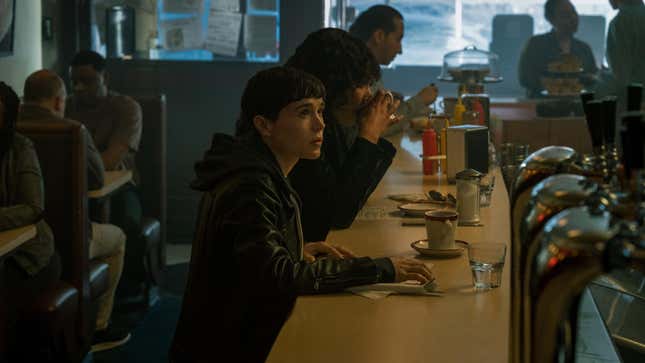
Most superhero shows fall somewhere on the spectrum between “all action” and “all feelings.” Do you, as a viewer, go to the capes-’n-powers well for pure smackdowns and badassery, or for messy moral quandaries and thorny relationship dynamics? If you’re an aficionado of the latter (and you have a high threshold for weird-ass shit), you’re likely already a fan of Netflix’s The Umbrella Academy. Steve Blackman’s adaptation of Gerard Way and Gabriel Bá’s comic-book series is an outlier in the increasingly crowded TV superhero landscape: Amid timey-wimey plot twists, stylishly surreal battles, and a sprawling ensemble, the series devotes the lion’s share of its runtime to the wages of trauma, resentment, and love among one of TV’s most fucked-up families. Oh, and it’s wickedly funny to boot. Now in its third season, The Umbrella Academy has become the cultiest of cult favorites.
The show’s lore is as deep and twisty as the Mississippi, but here are the basics: On a single day in 1989, 43 women across the world experienced spontaneous pregnancies, giving birth to superpowered children. Enigmatic billionaire Reginald Hargreeves (Colm Feore) adopted seven of them, whom he raised (in highly traumatizing fashion) to be a teen crime-fighting team. But after one of them dies young, the ad-hoc family separates, only to be reunited as adults on the occasion of their father’s suicide.
After narrowly subverting an apocalypse of their own making in the second season, the gang winds up time-displaced in 1963 Dallas, where they attempt to prevent the Kennedy assassination. In the season finale, they time-travel back to a present that isn’t their own. Reginald has replaced The Umbrella Academy with The Sparrow Academy, seven (mostly) new superpowered recruits who are a lot more disciplined—and a whole lot nastier—than our beloved antiheroes.
The Umbrella Academy hadn’t quite figured out what kind of show it wanted to be in its first season; but by the second installment, the series was firing on all cylinders. Blackman & Co. tightened up the plotting, and the often icy relationships among the siblings (sometimes with soap opera–level dialogue) gave way to warm, prickly affection. The show also grounded itself in heavy real-world dynamics, particularly when it came to the story of Allison (Emmy Raver-Lampman), the sole Black member of The Umbrellas, as she came up against racism in the 1960s American South and joined the civil-rights movement.
Season three continues to honestly grapple with everything its seven protagonists went through in the past, from Number Five (Aidan Gallagher), a teleporting 58-year-old trapped in the body of a tween, to Diego (David Castañeda), a telekinetic knife-thrower whose on-again, off-again girlfriend Lila (a wonderfully acidic Ritu Arya) follows him into the future with a big surprise in tow. (Klaus, played with chaotic abandon by Robert Sheehan, continues to druggily float above it all.)
But The Umbrella Academy, vitally, reserves the greatest care for the story of Vanya, played by Oscar nominee Elliot Page. The writers map the actor’s real-life transition onto his character, as the queer awakening he experienced back in the 1960s leads Vanya to becoming Viktor. The show deftly handles the conversations Viktor has with each of his family members about his transition, as well as showcases the way he comes into his own throughout the season. He becomes a wiser, wryer, and more confident person, a far cry from the frustratingly weak and underwritten Vanya we met at the beginning of the series.
Season three starts out strong, with a rollicking storyline, compelling mysteries, and a handful of killer twists, not to mention three musical montages within the first 15 minutes of episode one. The team also has a compellingly strange new HQ: The Hotel Obsidian, a stylishly anachronistic setting with a production design that falls somewhere between The Overlook and The Grand Budapest. Along the way, The Umbrella Academy tackles themes of parenting, grief, and power with absurdist humor and very real pathos. But don’t worry, there’s also a robot who forms a religion around a radiant black hole, a sentient floating cube named Christopher, and a mysterious man who listens to bee sounds on a Walkman when he needs to chill out.
Alas, the proverbial World’s Biggest Ball of Twine (which, yes, Klaus and Five do visit on an impromptu road trip) begins to unravel in the back half of the season. The Umbrella Academy does a heroic job of balancing its massive ensemble—but this time around, it’s a little too big. The members of The Sparrow Academy end up being pretty one-note, and one big romance is way too vanilla for a series this tart.
It all culminates in a season ender that’s somehow both too slow and too fast. The story spins off into abstraction just when it should be hitting bedrock, with repetitive emotional beats giving way to a climax so out there that the stakes don’t even feel like they matter anymore. Despite all that, The Umbrella Academy never stops being a blast—a bright ball of chaos enclosed in a Dyson sphere of hard-won devotion from what Five defines as not so much a family as “an institute for snarky delinquents.”